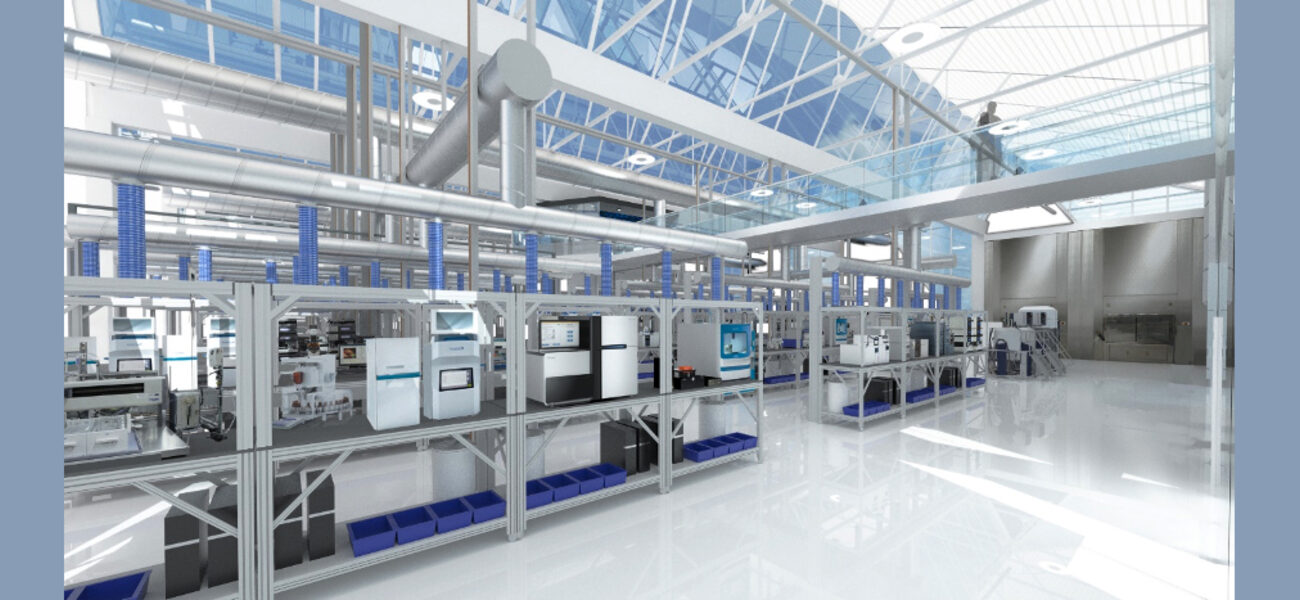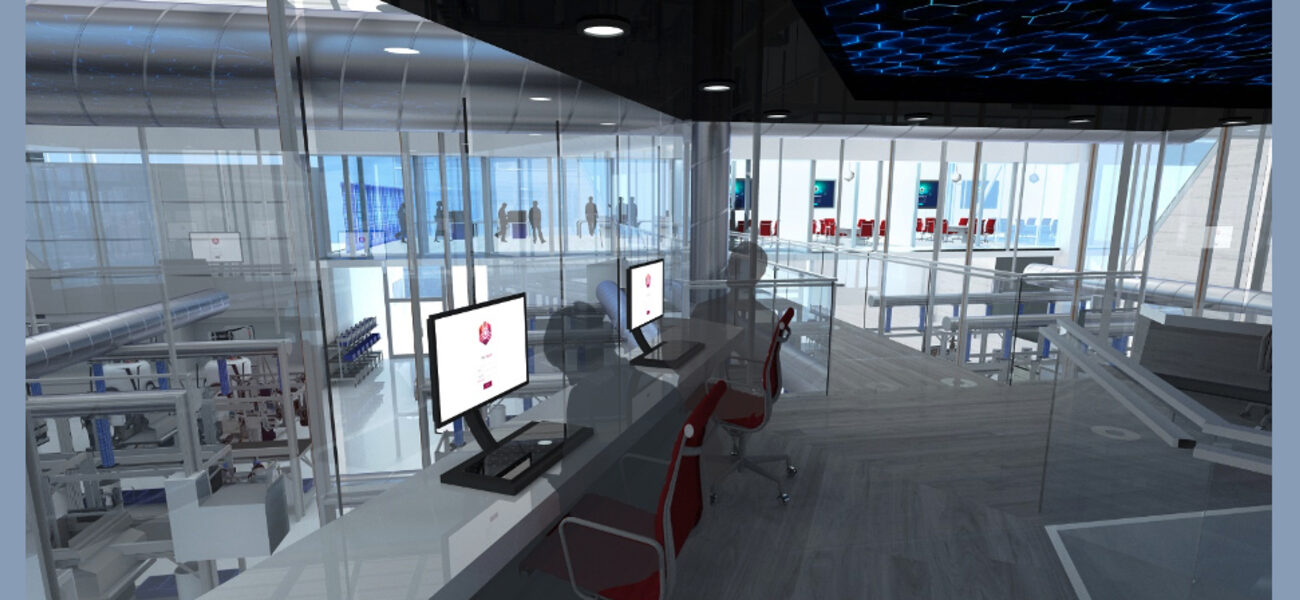Carnegie Mellon University (CMU) in Pittsburgh is working in partnership with San Francisco-based Emerald Cloud Lab on a new $40 million facility that will house more than 200 discrete life science and chemistry research instruments, but very few human researchers, teachers, or students. Instead, the instruments and artificial intelligence tools within the new CMU Cloud Lab can be accessed remotely via the cloud from anywhere in the world to conduct experiments at any time of the day or night. The new 16,000-sf Cloud Lab will be housed in a CMU-owned building in Pittsburgh’s Bakery Square, 10 minutes from the main campus. Construction is scheduled to conclude by May 2023 and to be fully operational by the fall 2023 semester.
Instruments within the CMU Cloud Lab will be tied together by proprietary software created by Emerald Cloud Lab, run primarily by robots, and overseen by a small team of trained technicians. Students and researchers design their experiments using computer code submitted through the internet to the Cloud Lab. This code gives instructions to robots that conduct the experiments, and resulting data are transmitted back through the cloud to the submitting researcher. Samples for experiments can be delivered in person to various drop spots around campus or mailed to the Cloud Lab.
“Life science research is often limited by the speed and the scale of data that can be acquired,” says Rebecca Doerge, Glen de Vries Dean of CMU’s Mellon College of Science (MCS). “The Cloud Lab will accelerate discovery by making state-of-the-art scientific equipment more readily available to students and researchers and by leveraging the capabilities of artificial intelligence to easily analyze large data sets.”
CMU’s new facility will be set up to mirror Emerald Cloud Lab, which was founded by Brian Frezza and DJ Kleinbaum, both alumni of MCS. Shortly after graduating with bachelor’s degrees from CMU, both were frustrated with the amount of time spent tying machines together and formatting data for various research projects. To address this, they founded Emerald Therapeutics which gave rise to Emerald Cloud Lab, where they developed proprietary software that not only ties instruments together but assists researchers with resulting analyses and exploration.
[This virtual tour of Emerald Cloud Lab shows what the CMU facility will look like, and this video link explains how cloud labs work.]
Doerge joined Carnegie Mellon in 2016 and was approached by Frezza and Kleinbaum one year later with their proposal to build the first academic cloud lab at CMU. Doerge admits it took close to eight months of convincing before she realized the magnitude of the impact this new facility promises to have on the future of both scientific research and science education.
Doerge compares this groundbreaking lab to the rise of cell phone technology. When cell phones were first introduced, very few people could have predicted how quickly they would evolve from large clunky machines into powerful hand-held computers that have changed the course of the telephone industry and most daily lives. Similarly, Doerge feels it is impossible to predict the dramatic impact that cloud labs will have on the future of research settings.
“Cloud labs are becoming more and more prevalent within industry, especially in the pharmaceutical and manufacturing sectors,” says Doerge. “As an academic institution, it is our responsibility to prepare students for the real world, and if cloud-based technology is leading the way, we want our students to embrace and thrive in that new type of work environment.”
How the Partnership Works
The Cloud Lab will be a legal partnership whereby CMU owns the building that houses the lab, all instruments, and all resulting intellectual property. Emerald holds the software license that allows the instruments to work together, and Emerald technicians will set up and operate the facility for the first few years, since they are already trained to run a cloud lab.
CMU’s Cloud Lab will have a slightly larger footprint than Emerald’s San Francisco lab and will include 12 additional instruments not yet found at Emerald Cloud Lab. Doerge points to this as an example of the dynamic nature of the lab space at CMU. “As an academic institution, we require other instruments that Emerald typically would not use for their business purposes,” she says. “As our needs change, we will work with Emerald to bring in different instruments that can be tied into the software.”
The initial business model for the CMU Cloud Lab will be to dedicate 80 percent of the facility’s research capacity for use by CMU staff, faculty, researchers, collaborators, and students. The remaining 20 percent will be available for use by researchers from Pittsburgh’s burgeoning life science start-up community.
“Pittsburgh is very much an up-and-coming biotech city, and wet labs are a hot commodity right now,” says Doerge. “Our hope is that the 20 percent of time we are able to rent out will generate a profit for CMU within four years, since we estimate that the entire facility will cost approximately $3.5 million to operate annually.”
She adds that cloud labs are ideal for small startup firms since they can avoid large upfront investments in wet lab space or equipment. Testing ideas in the cloud lab gives small firms the luxury of finding out quickly and inexpensively whether the idea will fail or succeed.
Improved Research Productivity
“Instead of having to provide each professor with a laboratory and their own instruments, all CMU students and professors will have 24-hour access to the Cloud Lab’s instruments.” says Doerge. Emerald’s projections show that research productivity using the Cloud Lab has the potential to improve by more than seven-fold, including doubling the number of both research papers and grant applications produced annually. Instead of asking for money for a $200,000 instrument, CMU staff can now write grants for time in the Cloud Lab.
Productivity gains are predicted because the Cloud Lab can conduct multiple experiments at the same time. Instruments within the Cloud Lab will run 24 hours a day, seven days a week, 365 days a year. In contrast to people, instruments and robots never get tired, do not require food breaks, and never make human errors such as mixing up samples.
“Despite the benefits of automation, we have no plans to completely eliminate traditional scientific classrooms or wet bench labs, because every student needs to go into a lab and have the frustrating experience of messing up a protocol, troubleshooting, and really understanding the chemistry or the biology of what they are doing,” says Doerge. “We will always have wet labs, just fewer of them.”
Enhanced Reproducibility
“Sensors throughout the lab will capture everything from temperature and humidity to the lifecycle of the machine,” says Doerge. “We will be able to do onsite synthesis, and everything is traceable and reproducible.”
Doerge adds that CMU’s Cloud Lab will be an open science facility allowing users access to computer code previously submitted. If someone questions results, they can rerun the computer code for themselves, or existing computer codes can be built upon by changing just a few lines of code. “The Cloud Lab really levels the playing field, since anyone with an original idea and access to the internet can use the Cloud Lab to compete at the same level,” says Doerge. “We are putting a very powerful tool into the hands of capable people who might not otherwise have had access, including people with physical disabilities or those who lack funding.”
CMU gained access to Emerald Cloud Lab in late 2019 to begin training faculty on the platform. When COVID hit in March of 2020, most wet lab research at the CMU campus came to halt. “Since we already had access to Emerald, we used the opportunity to train more faculty and students and really sell the idea of using the Cloud Lab,” says Doerge. “Some CMU faculty even taught classes using the Emerald Cloud Lab, so COVID demonstrated that it is possible to effectively teach science and conduct experiments remotely.”
By Amy Cammell

